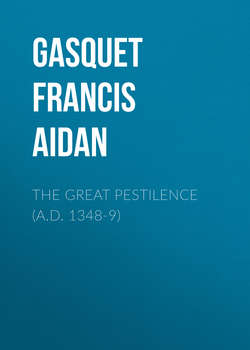The Great Pestilence (A.D. 1348-9)

Реклама. ООО «ЛитРес», ИНН: 7719571260.
Оглавление
Gasquet Francis Aidan. The Great Pestilence (A.D. 1348-9)
TO THE READER
INTRODUCTION
CHAPTER I. THE COMMENCEMENT OF THE EPIDEMIC
CHAPTER II. THE EPIDEMIC IN ITALY
CHAPTER III. PROGRESS OF THE PLAGUE IN FRANCE
CHAPTER IV. THE PLAGUE IN OTHER EUROPEAN COUNTRIES
CHAPTER V. THE PLAGUE REACHES ENGLAND
CHAPTER VI. PROGRESS OF THE DISEASE IN LONDON AND THE SOUTH
CHAPTER VII. THE EPIDEMIC IN GLOUCESTER, WORCESTER, WARWICK, AND OXFORD
CHAPTER VIII. STORY OF THE DISEASE IN THE REST OF ENGLAND
CHAPTER IX. THE DESOLATION OF THE COUNTRY
CHAPTER X. SOME CONSEQUENCES OF THE GREAT MORTALITY
Отрывок из книги
The story of the Great Pestilence of 1348–9 has never been fully told. In fact, until comparatively recent times, little attention was paid to an event which, nevertheless, whether viewed in the magnitude of the catastrophe, or in regard to its far-reaching results, is certainly one of the most important in the history of our country.
Judged by the ordinary manuals, the middle of the fourteenth century appears as the time of England's greatest glory. Edward III. was at the very height of his renown. The crushing defeat of France at Crecy, in 1346, followed the next year by the taking of Calais, had raised him to the height of his fame. When, wearing the laurels of the most brilliant victory of the age, he landed at Sandwich, on October 14th, 1347, the country, or at least the English courtiers, seemed intoxicated by the success of his arms. "A new sun," says the chronicler Walsingham, "seemed to have arisen over the people, in the perfect peace, in the plenty of all things, and in the glory of such victories. There was hardly a woman of any name who did not possess spoils of Caen, Calais and other French towns across the sea;" and the English matrons proudly decked themselves with the rich dresses and costly ornaments carried off from foreign households. This was, moreover, the golden era of chivalry, and here and there throughout the country tournaments celebrated with exceptional pomp the establishment of the Order of the Garter, instituted by King Edward to perpetuate the memory of his martial successes. It is little wonder, then, that the Great Pestilence, now known as the "Black Death," coming as it does between Crecy and Poitiers, and at the very time of the creation of the first Knights of the Garter, should seem to fall aside from the general narrative as though something apart from, and not consonant with, the natural course of events.
.....
The disease according to his account was incurable. Neither regularity of life nor bodily strength was any preservation against it. The strong and the weak were equally struck down; and death spared not those of whom care was taken, any more than the poor, destitute of all help. No other illness of any sort showed itself in this year; all sickness took the form of the prevalent disease. Medical science recognised that it was powerless before the foe. The course of the malady was not in all cases the same. Some people died suddenly, others during the course of a day, and some after but an hour's suffering. In the case of those who lingered for two or three days the attack commenced with a violent fever. Soon the poison mounted to the brain, and the sufferer lost the use of speech, became insensible to what was taking place about him, and appeared sunk in a deep sleep. If by chance he came to himself and tried to speak his tongue refused to move, and only a few inarticulate sounds could be uttered, as the nerves had been paralysed; then he died suddenly.
Others who fell sick under the disease were attacked first, not in the head, but in the lungs. The organs of respiration became quickly inflamed, sharp pains were experienced in the chest, blood was vomited, and the breath became fetid. The throat and tongue, burnt up by the excessive fever, became black and congested with blood. "Those who drank copiously experienced no more relief than those who drank but little."
.....